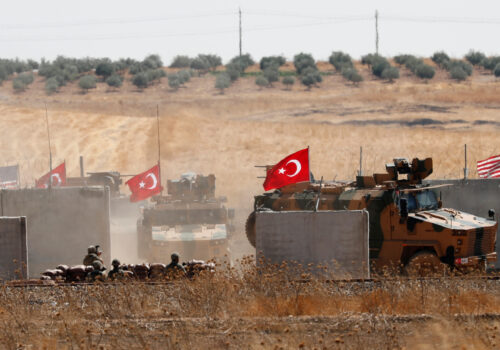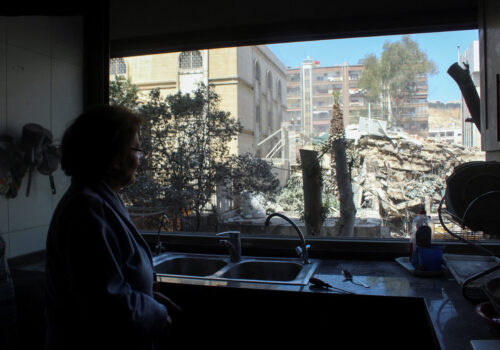Syria holds the key to improved US-Turkey ties
Turkish President Recep Tayyip Erdoğan was set to visit Washington in May after a long period of coldness between him and US President Joe Biden. While the cancellation officially occurred due to scheduling issues, disagreements over the Gaza conflict appear to have played a role in this decision. Despite recent momentum in US-Turkish relations, this situation underscores the fact that improving areas of cooperation is not enough to maintain the bilateral relationship.
It is crucial that the United States and Turkey overcome their differences because the governments need to strengthen their alliance—especially as it concerns Syria.
While the situation in Syria is viewed as a top security priority in Turkey, it is receiving less attention in the United States. That needs to change. Both countries need to refocus on resolving disputes involving Syria so that they do not explode into fresh areas of major stress on bilateral ties.
The structural realities
The differences in priorities between the United States and Turkey in Syria have been based on structural realities.
Both nations emphasize counterterrorism and unconventional threats in their foreign policies, but their objectives differ. In Syria, the United States concentrated primarily on combating the Islamic State of Iraq and al-Sham (ISIS). Turkey also fought against ISIS directly, but regarded the United States’ anti-ISIS approach as a threat to its national security. The US partnership with the Syrian Kurdish People’s Protection Units (YPG), the Syrian branch of the Kurdistan Workers’ Party (PKK)—a designated foreign terrorist organization—became Ankara’s top security concern.
SIGN UP FOR THIS WEEK IN THE MIDEAST NEWSLETTER
Additionally, the Turkish public and politicians have blamed a sect led by Turkish religious leader Fethullah Gülen, who resides in Pennsylvania, for the attempted coup in Turkey in 2016, which has complicated ties. Separately, Turkey’s purchase of the Russian S-400 air-defense system was a deal breaker for the United States, which expelled Turkey from the F-35 fighter jet program and issued new sanctions under a law primarily meant to target foreign adversaries—not NATO allies.
Meanwhile, Turkey’s attempts to normalize relations with its neighbors have been upended by Russia’s full-scale invasion of Ukraine in 2022 and Hamas’s attack on Israel on October 7, 2023. Despite their differences, these conflicts have pushed the United States and Turkey to value their alliance more.
Since the Ukraine war began, Turkey and the United States have established a new level of cooperation, expanding beyond sales of F-16 fighter jets to include Black Sea security, support for Ukraine, and defense-industry collaboration. Turkish assistance to Ukraine has included armed drones and cluster bombs, and the country has also enforced the Montreux Convention, which allows Ankara to regulate the passage of military ships through its straits during wartime. Furthermore, Turkey supplied NATO with 155-millimeter shells and protected NATO countries’ airspace in the Black Sea region. The country has also facilitated a grain deal between Ukraine and Russia to prevent a global food crisis.
More recently, US-Turkey relations played a significant role during the recent Israel-Iran escalation. Turkey acted as a mediator to prevent a regional war between the United States and Iran and to limit tit-for-tat responses from Iran and Israel. Although the conflict in Gaza could potentially damage US-Turkey relations, Ankara and Washington need to understand that the resolution of this war—through a ceasefire in the short term and a two-state solution in the long run—is fundamentally not about their bilateral relations.
The Syrian puzzle
Turkey and the United States have identified collaboration areas, but disputes still need to be resolved. The situation in Syria is particularly concerning, as any new escalation there could potentially disrupt the recent progress made in US-Turkey relations and compel Turkish decision-makers to address the imminent unconventional security threat on their doorstep.
If the United States fails to provide a solution to Turkey’s national security concerns, Russia and Iran may exploit that scenario and once again use Syria to exert pressure on Turkey. Ultimately, Russia and Iran want to reassert full territorial control of Syria for President Bashar al-Assad and push out Turkey.
There are more than four million Syrians currently living in northwestern Syria. If the conflict were to escalate, or if internally displaced peoples (IDP) camps along the Turkish-Syrian border were to be deliberately targeted, this could lead to a rise in migration toward Turkey. In fact, the United Nations warned in 2019 that a military escalation in Syria’s Idlib governorate could result in up to two million refugees. Turkey already has the largest refugee population in the world, and with anti-refugee sentiments on the rise in the country, an influx of new refugees would be disastrous for Turkish domestic politics. Moreover, Turkish soldiers are currently stationed on the ground in the area. As long as Russia maintains air superiority in northwest Syria, there is a risk of harm to Turkish soldiers. Russia has been directly responsible for the deaths of Turkish soldiers on numerous occasions, with the deadliest incident in 2020 when thirty-four Turkish soldiers were killed in a single airstrike carried out by the Bashar al-Assad regime during a Russian and Syrian offensive. (Former US Secretary of State Mike Pompeo and some anonymous Turkish officers claimed that Russia was behind the attack, but Russia denied responsibility.)
Also, from the US perspective, maintaining the status quo in Syria means the continuation of the Democratic Autonomous Administration of North and East Syria (DAANES) created by the YPG-dominated Syrian Democratic Forces, which Turkey is determined to destroy. The territory controlled by DAANES is predominantly Arab, but the Kurdish YPG holds significant control in political, military, and social spheres through a socialist one-party doctrine. Each passing day risks a new incursion by Ankara. It is not feasible for Turkey and the United States to count on the current relative calm in Syria persisting.
To make progress, both countries need to think big. The talking points that have dominated US-Turkey relations for the past decade are no longer valid. Rather than solely concentrating on counterterrorism, a broader geopolitical outlook must be considered. This shift is crucial because it allows Ankara and Washington to engage in a more strategic dialogue, which could pave the way for long-term solutions beyond immediate tactical concerns. It is time for the leaders of both nations to come together, show courage, and forge a new path.
It would be a significant and positive step if a deal could be made for Syria, where Russia, Iran, Turkey, and the United States currently have military presences. At the moment, despite Iran and Russia working together, NATO allies find themselves on opposing sides, trying to balance Tehran and Moscow’s alliance on their own. At a time when the United States is allocating $61 billion for Ukraine and $26 billion for Israel, it seems wrong for it to consider withdrawing from Syria. The US-Turkey divergence in Syria regarding tactics and priorities in counterterrorism appears misplaced.
It would be beneficial for decision-makers to work together to find a joint approach that would require the unification of Turkish and US spheres of influence in Syria. The United States could trade its support for the YPG in exchange for the Turkish army taking over most of the missions of US troops deployed in Syria and the preservation of Syrian Kurdish gains in the country. In this particular scenario, the United States would assign the task of managing ISIS prisoners and their families to local Sunni Arabs and Turkey, with the United States overseeing the process.
This would transform the Syrian conflict from a three-way battle to a two-way one, and thus pave the way for a political resolution. United Nations Security Council Resolution 2254 outlines a transition period between the Syrian government and the opposition. However, the United States is currently supporting a third faction, the YPG-dominated Syrian Democratic Forces. This is not part of the resolution, and indirectly aids Russia and Iran in blocking the political process.
Such an agreement would positively impact NATO and hold great geopolitical significance. Resolving the dispute in Syria would be a breakthrough. After restoring bilateral trust and turning Syria from a dispute into cooperation, both NATO allies could enhance their cooperation in other theaters to advance the Alliance’s interests. Also, within the Middle East context, an agreement could pave the way for improved collaboration between Turkey and the United States in Iraq.
The cancellation of Erdoğan’s visit is just a symptom of a wider problem. Ankara and Washington must adopt a broader perspective and be willing to make strategic concessions to manage and resolve issues that divide them. The changing nature of conflicts in Turkey’s region necessitates a fresh approach that values conventional alliances while recognizing new geopolitical realities.
Syria is the key to stable and robust relations. Otherwise, Turkey and the United States will not be able to fulfill their relationship’s potential, and a new regional escalation may undermine all of the recent progress in the partnership. Ankara and Washington must not allow that to happen.
Ömer Özkizilcik is a nonresident fellow for the Syria Project in the Atlantic Council’s Middle East Programs.
Further reading
Tue, Feb 20, 2024
Here’s what an uncoordinated US withdrawal from Syria would look like. It’s bad for many partners, but especially Turkey.
MENASource By Ömer Özkizilcik
An uncoordinated withdrawal from Syria by the United States could pose significant risks for Turkey, leaving the country alone against Iran and Russia.
Thu, Apr 25, 2024
The Syrian parliamentary elections are coming up. Should anyone care?
MENASource By
The polls will be held again against a backdrop of massive displacement, unresolved conflict, partial occupation, and an intransigent regime.
Fri, Apr 5, 2024
Most GCC states condemned the attack on the Iranian embassy complex in Syria. An escalation is what they fear most.
MENASource By
Fearful that hostilities between Israel and Iran could spiral out of control, the GCC states are keen to avoid the heat as much as possible.
Image: Russian President Vladimir Putin, Iranian President Ebrahim Raisi and Turkish President Tayyip Erdogan pose for a picture before a meeting of leaders from the three guarantor states of the Astana process, designed to find a peace settlement in Syria crisis, in Tehran, Iran July 19, 2022. Sputnik/Sergei Savostyanov/Pool via REUTERS


